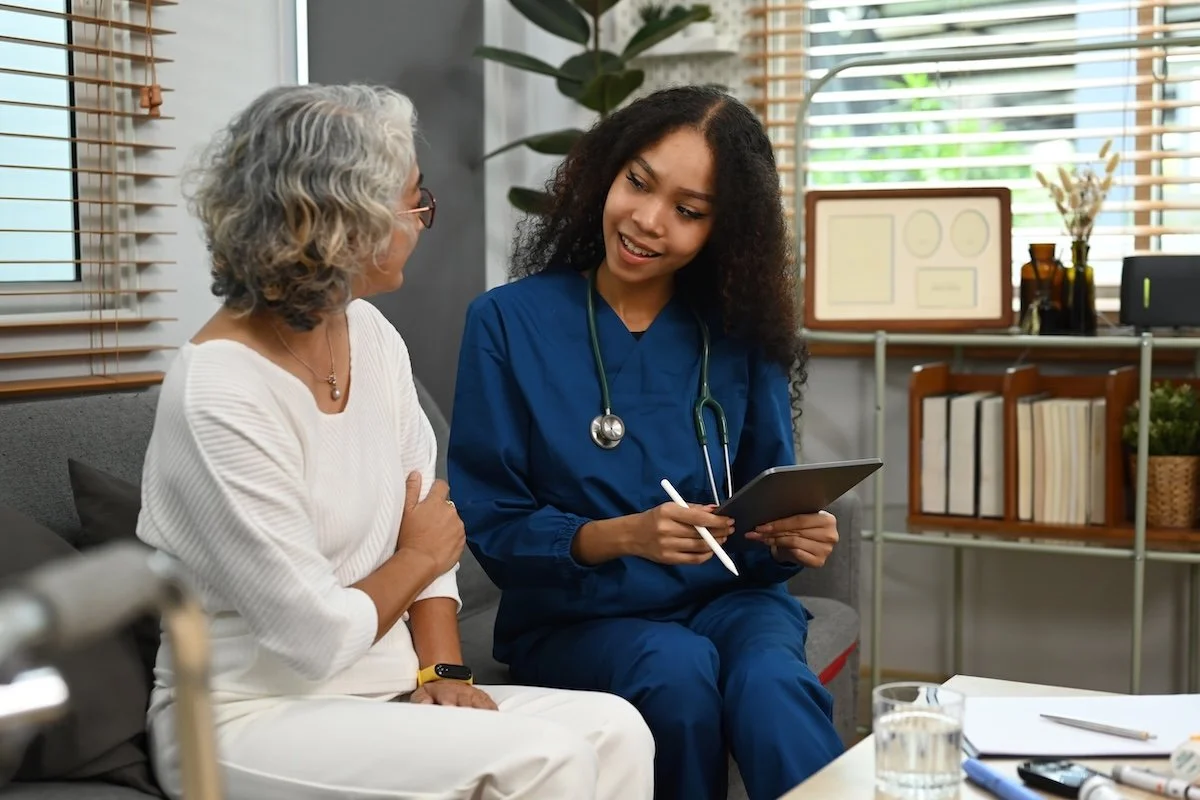Questions About Menopause? We’ve Got Answers
Last updated August 2025
Menopause is a natural stage of life, but it can also bring unexpected changes, questions, and—let’s be honest—frustrations. While every woman’s experience is unique, knowing what to expect and how to navigate it can make the journey much smoother.
Whether you’re just starting to notice changes, deep in the throes of hot flashes, or simply curious about what’s ahead, this guide is here to help you understand the stages of menopause, common symptoms, treatment options, and ways to care for your overall health.
Table of Contents
1. Understanding the Stages of Menopause
What is menopause?
Menopause marks the end of menstrual cycles and fertility. It’s officially diagnosed when you’ve gone 12 consecutive months without a period. In the U.S., the average age is 51, though it can happen earlier or later. Hormone production, particularly estrogen and progesterone, declines significantly, triggering common symptoms like hot flashes and night sweats.
What is perimenopause?
Perimenopause is the transitional period before menopause, typically lasting 4–6 years. Hormone levels fluctuate, periods become irregular, and symptoms like hot flashes, night sweats, and mood changes may begin.
What is early menopause?
Early menopause happens when menopause occurs before age 45, whether naturally or due to medical treatments like surgery, chemotherapy, or radiation. Women experiencing early menopause may face unique health risks and should discuss hormone replacement and preventive care with their provider.
How is menopause diagnosed?
For most women, diagnosis is based on their history and symptoms; lab tests aren’t usually necessary. In cases where periods are absent for reasons other than menopause (such as hysterectomy), bloodwork may be used to check hormone levels.
2. Common Physical Symptoms
Why am I experiencing hot flashes and night sweats?
These are caused by changes in the body’s temperature regulation linked to lower estrogen levels. About 85% of women experience them during menopause.
Is weight gain inevitable?
Aging naturally slows metabolism, and lower estrogen levels can shift fat storage to the midsection. While some weight gain may occur, a balanced diet and regular movement can help manage it.
What about vaginal dryness or discomfort during sex?
Declining estrogen can cause thinning of vaginal tissues, making them less elastic and more prone to dryness. Over-the-counter lubricants and moisturizers can help, and prescription options are available.
Why do I have joint pain now?
Estrogen helps protect joint health, and its decline can contribute to stiffness and discomfort. Gentle exercise, stretching, and an anti-inflammatory diet may help; persistent pain should be evaluated by your provider.
Can menopause cause headaches?
Hormone fluctuations can trigger headaches or migraines for some women. Tracking patterns and avoiding triggers, combined with medical treatment when needed, can provide relief.
What about hair thinning or hair loss?
Lower estrogen and progesterone can slow hair growth cycles, leading to thinning hair. Nutrient-rich diets, gentle hair care, and targeted treatments can help maintain hair health.
3. Mental and Emotional Well-being
Why am I more irritable or anxious lately?
Hormone changes, sleep disruptions, and life stressors (like caregiving or “empty nest” transitions) can all affect mood. Perimenopause is a particularly vulnerable time for mood shifts.
Is depression common during menopause?
Women with a history of depression may be more prone to recurrence during this stage. Persistent sadness, loss of interest, or hopelessness should be discussed with your provider—help is available.
How can I manage brain fog?
Cognitive changes—like forgetfulness or difficulty focusing—can be common during menopause. Prioritizing sleep, reducing stress, staying physically active, and challenging your brain with new activities can help.
“Menopause is a whole-body transition. Supporting mental health is just as important as addressing physical symptoms.”
-Dr. Eileen West, MD, FACP, NCMP, CCD at Eileen West MD and Associates
4. Nutrition and Lifestyle Habits
What’s the best diet during menopause?
Many experts recommend a Mediterranean-style diet, rich in fruits, vegetables, legumes, whole grains, fish, and healthy fats, for overall wellness and heart health.
How can I improve my sleep?
Maintain a consistent bedtime, keep your bedroom cool, limit caffeine, and avoid screens before bed. If hot flashes are waking you, talk to your provider about strategies to minimize them.
Does exercise really help symptoms?
Yes, regular movement supports bone health, heart health, mood, and weight management. It doesn’t have to be intense; walking, yoga, swimming, or light strength training all help.
5. Medical Treatments and Therapies
What about hormone therapy?
Hormone therapy (HT) can be highly effective for hot flashes, night sweats, and vaginal symptoms. Your provider will help weigh the benefits and risks based on your personal health history.
Are there non-hormonal options?
Yes, there are prescription medications, supplements, and lifestyle adjustments that can help manage symptoms without hormones.
How do I know what’s right for me?
Discuss your symptoms, health history, and preferences with a menopause-trained provider. Every woman’s treatment plan should be individualized.
6. Navigating Healthcare Conversations
My doctor never asks about menopause. How do I bring it up?
Prepare a simple opener like, “I’d like to discuss menopause symptoms I’m experiencing.” Be specific about what’s bothering you so your provider can offer targeted solutions.
What if my provider seems uncomfortable or dismissive?
It’s okay to seek a second opinion, preferably from someone trained in menopause care. Learn more about our approach to menopause care ›
7. Additional Resources
Bottom line: Menopause is a personal journey. While the changes can be challenging, knowledge and the right support can make this transition a time of strength, self-discovery, and better health.




